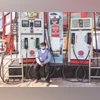The Delhi Petrol Dealers' Association (DPDA) has announced the resumption of operations at pollution under control certificate (PUCC) centres, which had been closed since July 15 due to a dispute over increased certificate rates. This decision followed a meeting between DPDA representatives and officials from the transport department, including the principal secretary.
The DPDA initiated the temporary shutdown in protest against the recent hike in PUCC rates, which they argued did not adequately reflect the rising operational costs. The DPDA maintained that the rate increase proposed by the Delhi government was insufficient to cover the expenses associated with running these centres.
In an official statement, the DPDA confirmed that the meeting with the transport department resulted in an agreement to call off the strike.
“It was decided that DPDA will immediately call off the strike and resume PUCC operations in the interest of the general public of Delhi,” the statement read. The principal secretary also agreed to reconsider the rate hike based on actual operational costs, with the DPDA set to submit a detailed justification.
Why did Delhi petrol dealers shut down PUCC centres?
On July 11, the Aam Aadmi Party (AAP)-led Delhi government announced the first revision in PUCC charges in 13 years, with an increase ranging from Rs 20 to Rs 40. The new rates, which would take effect once officially notified, were as follows:
- For petrol, CNG, LPG, and bio-fuel two and three-wheelers: Rs 80 (up from Rs 60)
- For four-wheelers: Rs 110 (up from Rs 80)
- For diesel vehicles: Rs 140 (up from Rs 100)
Despite these changes, DPDA President Nischal Singhania expressed concerns about the viability of running PUCC centres.
More From This Section
“The Rs 20 and Rs 30 hike is nothing compared to the rising operational costs. The government’s revision does not consider inflation and the actual cost of maintaining these centres,” Singhania told PTI. He highlighted that operational costs, including wages and the cost of PUC checking machines, have significantly increased over the years, rendering the current fee hike inadequate.
Political reactions and public impact
The shutdown of PUCC centres had drawn criticism from various political quarters. Delhi Congress Chief Devender Yadav accused the AAP government of internal disorganisation, claiming that the closure of over 900 PUCC centres had left thousands of vehicles on the road without proper pollution clearance certificates. Yadav urged the AAP and Bharatiya Janata Party (BJP) to adopt the governance model of the previous Sheila Dikshit-led Congress administration to tackle air pollution more effectively.
The closure had a notable impact on vehicle owners in Delhi, where over 900 PUCC centres operate, with more than 700 located at petrol pumps. The resumed operations will alleviate the backlog and ensure that vehicles comply with pollution control norms, contributing to the city's efforts to combat air pollution.
DPDA resumes PUCC centre operations
The DPDA's decision to resume operations is a relief for the public, but the association continues to push for a more substantial revision of PUCC rates to ensure financial sustainability. The transport department's agreement to revisit the rate hike based on detailed cost analysis is a positive step towards resolving the long-standing issue.
As the discussions progress, the DPDA and transport department's collaboration will be crucial in balancing operational viability with public service, ensuring that Delhi's pollution control measures are both effective and economically feasible.
(With agency inputs)

)
